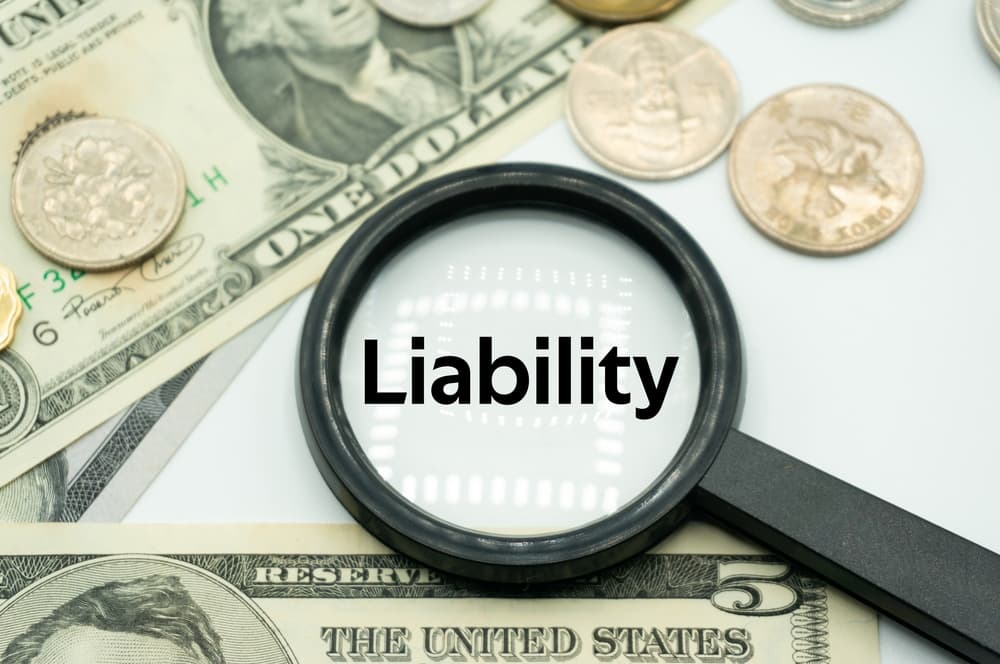In the context of personal injury claims and insurance coverage, liability refers to fault – and, more specifically, legal responsibility for an accident or occurrence. An individual or entity may act unreasonably and cause an accident.
For example, they might take some action that a hypothetical reasonable person should not have taken in the same situation or set of circumstances. Alternatively, they may have refrained from taking some action that a hypothetical reasonable person should have taken in the same scenario.

When an insurance company accepts fault or liability for an accident, they essentially say that their insured behaved unreasonably under the circumstances – and that their insured was at fault. Consequently, they (the insurer) may pay some or all of the damages that the accident victim claims.
When an insurance company accepts fault for an accident, they may place a monetary settlement offer on the table. However, these very low initial offers are usually not worth accepting.
A knowledgeable personal injury attorney can handle all communications and negotiations with insurance company representatives directly, increasing your chances of obtaining a favorable settlement offer or litigation result in your case.
A car accident lawyer in San Antonio can file a claim with the appropriate insurance company on your behalf, aggressively negotiate a settlement offer, or file a lawsuit and litigate your case to an efficient resolution in the state court system.
Your lawyer can also let you know whether a particular settlement offer is likely a good settlement offer, given your injuries and the facts and circumstances of your case. Every step of the way, your lawyer can answer your questions, weigh the pros and cons of various options, and guide you through your decision-making process.
How to Prove Fault in a Personal Injury Case
To prove that an individual or entity was responsible for an accident, an accident victim must satisfy several legal elements of proof.
First, the accident victim must show that the other individual or entity owed them a legal duty of reasonable care, which they subsequently violated. For example, everyone has a duty to drive safely and carefully at all times and to obey all traffic laws and regulations.
Next, the accident victim needs to prove that the other party breached their legal duty of care. In a car accident scenario, a breach occurs when another driver speeds, drinks and drives, or exhibits road rage.
Additionally, the accident victim must establish that as a direct result of the other party’s breach, the occurrence and their injuries resulted. To recover monetary compensation in a personal injury claim, the accident victim must have suffered at least one physical injury.
A personal injury attorney in your area can retain one or more experts who can help you satisfy your legal burden in a personal injury case. Potential experts may include accident reconstructionists and medical experts.
An accident reconstructionist may help if the insurance company disputes liability for the accident or says that their insured was not at fault.
An accident reconstructionist can visit the accident scene, review photographs, read police reports, speak with eyewitnesses, and review video camera footage of the occurrence, if available. They may then draft a report in which they describe how the accident likely happened and who was responsible. An accident reconstructionist can also testify at a civil jury trial or deposition in support of the accident victim’s case.
Similarly, a medical expert can causally relate an accident victim’s injury or injuries to the accident. A medical expert may also establish that one or more of the accident victim’s claimed injuries are permanent. Unlike most injuries that recover after a period of time passes, a permanent injury may last a lifetime and cause the accident victim to experience lifelong symptoms.
A personal injury attorney in your area can retain the necessary experts to establish your legal burden of proof in a case.
Accidents that may Lead to Personal Injuries
The negligent actions and inactions of others can lead to very serious accidents.
Some of the most common situations that arise from another individual or entity’s negligence include:
- Pedestrian accidents
- Mass transit accidents
- Car and truck accidents
- Bicycle and motorcycle accidents
- Boating accidents
- Workplace accidents
- Construction and building-site accidents
- Escalator accidents
- Elevator accidents
- Slip and fall occurrences on someone else’s premises
If you suffered injuries in one of these types of accidents that a negligent party caused, you may recover monetary damages for your injuries and other accident-related losses.
A personal injury attorney in your area can identify potential avenues of insurance coverage and explore your various legal options. For example, your lawyer can file a claim with the at-fault party’s insurer for favorable settlement compensation. Alternatively, your lawyer may file a lawsuit against the at-fault individual or entity.
Types of Injuries that Accident Victims Suffer
When other individuals and entities behave in a negligent manner, accidents may happen, which in turn result in debilitating injuries. Since every accident situation is different, not all accident victims will experience the same injuries, pain, and other symptoms.
Factors that may influence the nature and extent of an accident victim’s injuries include the specific body part or parts involved, the amount of force involved in the accident, and the type of accident that occurs.
Some of the most common injuries that accident victims may suffer include:
- Open cuts and lacerations
- Spinal cord injuries
- Paralysis injuries
- Bruises
- Internal bleeding
- Internal organ damage
- Bone fractures
- Rib fractures
- Soft tissue injuries
- Traumatic brain injuries
- Mouth and teeth injuries
- Facial contusions
- Scars
- Eye injuries
If you experienced one or more of these injuries due to another person’s negligence, seek the medical help that you need and focus on completing your medical treatment regimen.
A healthcare provider can refer you to a medical specialist, such as an orthopedist or neurologist, depending on your symptoms. You might also need to follow up with a primary care doctor or physical therapist at some point during your treatment regimen.
By completing all of your medical treatment, you are more likely to make a full recovery from your injuries and obtain the favorable monetary compensation that you need to become whole again after your accident.
What Happens When the Insurance Company Rejects or Accepts Liability for an Accident?
After you complete your medical treatment, your lawyer can forward a settlement demand package to the insurance company for the at-fault party. This demand package will include various types of important documentation that may later serve as evidence in your case.
Pertinent documentation can include:
- Police reports.
- Medical bills.
- Lost income documents from an employer.
- Medical treatment records.
- Photographs of injuries.
- Video footage of the accident.
- Property damage photographs.
The insurance company adjuster handling your claim will typically review all of these documents and decide on liability for the accident. In other words, they will determine whether their insured was at fault for the occurrence.
If the insurance company denies liability for the accident, then your attorney may go ahead and file a personal injury lawsuit in the court system on your behalf, depending upon the circumstances.
If the insurance company accepts liability for the accident, then your attorney may engage in ongoing settlement negotiations with the adjuster.
During settlement negotiations, insurance companies typically start very low and work their way up. Adjusters often take this route because they want to try and settle a claim for as little money as possible.
After all, insurance companies are not in the business of paying out large sums of money to settle cases. Rather, they want to try and keep as much of their money in-house as possible.
Your personal injury attorney can aggressively negotiate with the adjuster on your behalf in pursuit of a fair settlement offer that truly compensates you for your accident-related losses.
Settlement negotiations typically proceed back and forth until the parties either reach an agreeable settlement offer – or an impasse. During negotiations, your lawyer may highlight the strengths of your medical records and expert reports, property damage photographs, and other important evidence in your case while downplaying any case weaknesses. Your attorney may also initiate litigation if they don’t increase their monetary offer significantly.
What is Personal Injury Litigation?
Litigation in a personal injury case begins when the accident victim’s attorney files a lawsuit in the state court system. The parties will then take part in a process known as discovery.
During discovery, the parties will continue exchanging documents, answer written Interrogatories, and partake in depositions.
During a deposition, the defense attorney will likely ask the accident victim questions about how their accident occurred, the medical treatment that they underwent, the severity of their injuries, and the overall effects that the accident has had on their well-being, their life, and their ability to function.
During this time, settlement negotiations between the parties may continue, and the case can still resolve out of court at some point. In fact, the vast majority of personal injury claims settle at some point along the way in an attempt to avoid further litigation and expense.
However, if the parties cannot reach a resolution during the litigation stage of their case, they may take their case to a civil jury trial and allow a jury to decide the outcome.
Alternatively, they may pursue mediation or binding arbitration as a means of resolving their case out of court. At a binding arbitration hearing, a neutral arbitrator will hear testimony, review written evidence, and decide the issue of monetary compensation to award the injured accident victim.
Deciding how best to proceed with a personal injury claim is often difficult. However, a personal injury lawyer can weigh the pros and cons of each option for you so that you can make an intelligent and informed decision in your case.
Recovering Monetary Damages for Personal Injuries
Injured accident victims can collect monetary compensation for both their economic out-of-pocket damages and their intangible losses.
Economic damages frequently include:
- Monetary compensation for loss of earnings.
- Loss of earning capacity.
- Past and anticipated medical expenses.
Intangible losses typically include compensation for mental anguish, loss of spousal consortium, pain and suffering, loss of life enjoyment, inconvenience, loss of the ability to use a body part (i.e., due to spinal cord damage or paralysis), permanent disability or disfigurement, permanent scarring, or long-term care costs.
When it comes to maximizing your monetary compensation in a personal injury case, your lawyer can aggressively engage in ongoing settlement negotiations with the insurance company or litigate your case in system at a civil jury trial or other legal proceeding.
Speak With a Local Personal Injury Attorney about Your Legal Matter Today
If you recently suffered injuries in an occurrence that resulted from another person’s negligence, retain a knowledgeable attorney to represent you in your case as quickly as possible.
Accident victims must file a personal injury lawsuit within two years of their accident date. If they wait too long to take legal action in their case, they may forever waive their right to recover the monetary compensation they need and deserve.

A skilled personal injury attorney can enter an appearance in your case right away and begin investigating the circumstances of your accident. If the insurance company denies liability in your case, your lawyer can challenge that dispute by filing a lawsuit on your behalf in the state court system. Otherwise, your attorney can represent you during all settlement negotiations and enable you to make intelligent and informed decisions at every stage of the legal proceedings.
Your attorney will do everything they can to maximize the monetary award that you receive via settlement or litigation for all of your accident-related injuries and losses. This not only protects your financial future but gives you peace of mind while you focus on your physical recovery. Seek a no-cost, no-obligation consultation today.
